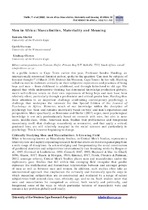Men in Africa: masculinities, materiality and meaning

View/
Date
2010Author
Shefer, Tamara
Stevens, Garth
Clowes, Lindsay
Metadata
Show full item recordAbstract
At a public lecture in Cape Town earlier this year, Professor
Sandra Harding, an internationally renowned feminist author,
spoke to the question ‘Can men be subjects of feminist
thought?’ (1 March 2010, District Six Museum, Cape Town). In
her talk, Harding called on men to elaborate critically on their
subjective experiences and practices of being boys and men –
from childhood to adulthood, and through fatherhood to old age.
She argued that while androcentric thinking has dominated
knowledge production globally, men’s self-reflexive voices on
their own experiences of being boys and men have been relatively
silent, particularly through a profeminist and critical gender
lens. Harding thus drew attention to an important challenge
confronting contemporary psychology, a challenge that underpins
the rationale for this Special Edition of the Journal of Psychology
in Africa. However, much of our knowledge within the
discipline of psychology has been and remains uncritically
based on boys’ and men’s experiences and perspectives. More
specifically, as Boonzaier and Shefer (2007) argue, most psychological
knowledge is not only predominantly based on research
with men, but also in most cases, middle-class, white,
American men. Studies that problematise and foreground masculinity
itself, that challenge masculinity as normative, and that
apply a critical, gendered lens, are still relatively marginal in the
social sciences and particularly in psychology. This is however
beginning to change.
